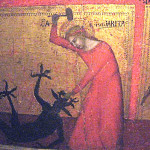We run our website the way we wished the whole internet worked: we provide high quality original content with no ads. We are funded solely by your direct support. Please consider supporting this project.

Where is Human Free Will in the Bible?
The Bible is emphatic on its teaching that humans possess free will and are capable of originating evil. Notice, for example, that in the very first chapter of the Bible God commands humans to be fruitful and exercise dominion over the animal kingdom and the earth (Gen. 1:26). The fact that God must command us to carry out his will reveals that we are not forced to carry out his will. We can choose to obey God or not, as the subsequent narrative makes clear.
Human free will is manifested in the fact that, throughout Scripture, God gives us choices and calls on us to choose the way he knows is best. To give just a few illustrations, notice the way God talks to the Israelites when finalizing his covenant with them at the end of Deuteronomy:
See, I set before you today life and prosperity, death and destruction. For I command you today to love the Lord your God, to walk in his ways…then you will live and increase, and the Lord your God will bless you in the land you are entering to possess. But if your heart turns away and you are not obedient, and if you are drawn away to bow down to other gods and worship them, I declare to you this day that you will certainly be destroyed…I have set before you life and death, blessings and curses. Now choose life, so that you and your children may live…(Duet 30:15-19).
God gives the Israelites a choice to either choose life (which means choosing to love and obey him) or to choose death (which means rejecting him). God obviously hopes they’ll choose life, but it is ultimately up to them to decide. In a world that is centered on love, even God can’t be guaranteed to always get what he wants.
Another clear example of the Lord placing choices before people, calling on them to choose to follow him, is found in Ezekial 18.
If a man is righteous and does what is lawful and right….he shall surely live, says the Lord GOD….The person who sins shall die….But if the wicked turn away from all their sins…they shall surely live; they shall not die.
Having laid out the choices before us, God discloses his own feelings about the matter when he asks:
Have I any pleasure in the death of the wicked, says the Lord GOD, and not rather that they should turn from their ways and live?… Cast away from you all the transgressions that you have committed against me, and get yourselves a new heart and a new spirit! Why will you die, O house of Israel? For I have no pleasure in the death of anyone, says the Lord GOD. Turn, then, and live. (Ezek. 18:5,9, 20, 23, 31-32).
The Lord makes it emphatically clear that he doesn’t want anyone to perish. He takes no pleasure in the death of the wicked. He rather wants everyone to embrace the life he offers them. But because love must be freely chosen, he cannot simply decree that he will get what he wants. He pleads with people to turn to him, but he will not coerce them.
Another way Scripture reveals that humans are free is by depicting them as the originators of their own free actions. For example, Jesus’ taught that, “The good person out of the good treasure of the heart produces good, and the evil person out of evil treasure produces evil; for it is out of the abundance of the heart that the mouth speaks” (Lk 6:45, emphasis added). Similarly, Jesus taught that it was out of the person’s own heart that “evil intentions, murder, adultery, fornication, theft, false witness, [and] slander” arise (Mt 15:19). These are not things that God in any sense desires or intentionally plans. They originate in a persons’ own heart.
Evil originates in us, not God. To give just a few more illustrations, we could cite King Solomon (I Kgs 11:6, 9), King Rehoboam (2 Chron 12:14), and King Zedekiah (2 Chron 36:12-13). Jerusalem degenerated to such a low moral point during the time of Jeremiah, according to the Bible, because God’s people had “a stubborn and rebellious heart” and had “turned aside and gone away” (Jere 5:23, emphasis added). In frustration, the Lord asked them, “How long shall your evil schemes lodge within you? (Jere 4:14, emphasis added).
Because agents are genuinely free, many things God wills don’t get accomplish, and many evils God wishes could be prevented take place. Yet, because God is infinitely wise and retains over-all control of the cosmos, we can rest assured that his promise to eventually overcome all opposition and achieve his purposes will come to pass.
Category: General
Tags: Evil, Free Will, God's Will, Love, Problem of Evil, Theodicy
Topics: Spiritual Warfare, Cosmic Conflict
Related Reading

Warfare Worldview: A Basic Definition
The warfare worldview is based on the conviction that our world is engaged in a cosmic war between a myriad of agents, both human and angelic, that have aligned themselves with either God or Satan. We believe this worldview best reflects the response to evil depicted throughout the Bible. For example, Jesus unequivocally opposed evils…

A Natural Disaster With No One to Blame
In a recent article from Relevant Magazine, Michael Hidalgo asks, “why are the leaders who claim that God acts through natural disasters so quiet all of a sudden?”

Love OR Judgment – You Can’t Have Both
Image by Morgan Sessions We cannot judge others because it is not our place as humans to function as the center—because God is that center—and judge other people. In addition, we cannot judge others because we ourselves are sinners who deserve judgment. If we don’t want to be judged, Jesus says, we must not judge. The…

How People Misunderstand Open Theism
Open theism holds that, because agents are free, the future includes possibilities (what agents may and may not choose to do). Since God’s knowledge is perfect, open theists hold that God knows the future partly as a realm of possibilities. This view contrasts with classical theism that has usually held that God knows the future exclusively as a domain…

Sanctuary
. SantiMB . via Compfight Jamie Wright wrote this penetrating essay of encountering a woman in a moment of extremity and need. It’s a reminder of our great need for a sanctuary, a safe place to come when the world has gone mad and we have nowhere else to go. From her essay: Because,…

Sermon Clip: Dear Abby
In this short sermon clip, Greg Boyd discusses Matthew 7. The infamous “plank in your own eye vs a speck of dust in your neighbors. He clarifies what this verse means when you have a close friend with an issue that you are helping them with. In the full sermon of Heart Smart our team…
